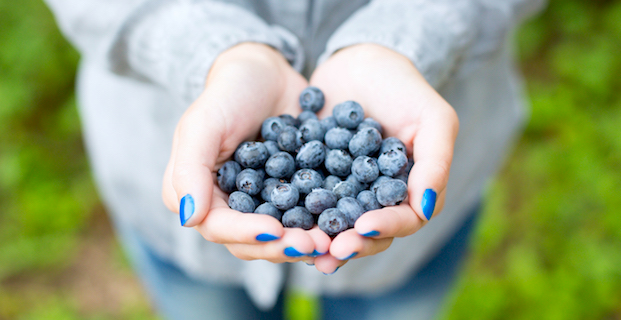Brain Food Helps Fuel Your Creative Juices

Coffee isn’t brain food; don’t rely on it to spark your creativity.
Every day, we’re bombarded with advice about what we need to put in our bodies to become:
- A better athlete
- A more efficient worker
- Safe from outside influences
- A growing teen
- An aging senior
- A healthy middle-aged anybody
But you barely see any advice for what brain food and nutrition can help you better use your noggin to be more creative, think outside the common areas of the park or tap into hidden sources of inspiration. The mind/body connection has clearly been defined and proven beyond any reasonable doubt. Yet creativity and inspiration still too often get left primarily to the unseen, mysterious realms of spirituality and/or religion.
Brain Food for Thought
While new technology or updated apps on all your devices might make them smarter, they actually do little for your own brain. In fact, the internet, Google and all other higher forms of the internet of things (IoT) has indeed given humans the ability to find, extract and process information quicker than ever – in effect, making us smarter. But rarely can technology and its spurious offspring act as brain food for higher levels of thinking – like art, prose and music.
Instead, consider relying on the research that does inform the human brain to produce effectively and efficiently. In other words, eat more brain food, and you can become more creative. Some of the best foods for higher thinking include:
- Dark chocolate. A cup of dark hot chocolate provides more antioxidants than green tea or red wine, two other common sources of drinkable brain food.
- Broccoli. A natural source of vitamin K, broccoli plays a huge role in blood coagulation in your brain, which keeps the blood and fat in your brain modulated, balanced and stress-free.
- Eggs. This is your brain on eggs: smoothly operating as ideas fire off one after another. Eggs are a good source of the neurotransmitter acetylcholine that helps cells in your brain communicate with one another. It also fosters a better memory.
- Fish. The omega-3 fatty acids contained in fish – like salmon, mackerel and tuna – act like weights for building your creative muscles. As far as brain food goes, these little fatty acids are hard to beat.
- Blueberries. Now this is one all-around powerful brain food. It should fill your freezer and fruit basket every day. Not only are blueberries a superb source of antioxidants, they also boost the production of good sugar, or glucose, in the body. And since your brain can’t store glucose for later use, like fat or muscles in other parts of your body, your brain needs a constant supply to keep it fresh and healthily creative so it can spin out new ideas.

Blueberries are amazing brain food!
Supplementing Bad Food with Brain Food
One of the biggest zappers in terms of healthy nutrition is processed food, which also contains harmful chemicals that only work to derail concentration, creativity and constructive ideas. Ideally, every working writer needs fresh, organic live foods that haven’t been processed. Even if you’re just noodling around on the keyboard and haven’t yet decided whether to publish or not, beware of processed food. It’s not your best source of nourishment.
So you say you can’t afford fresh fruits and veggies every day? So you’re not a very cook? You’re the type of writer who gets started on a project and forgets to stop and eat? If you can’t make a daily habit of consuming fresh, wholesome brain food, you can make up for your lack of nutrients with supplements designed just for this purpose.
Talk to your doctor, though, before starting on a regimen of supplements. Some of them may counteract other medications you may be taking. Some supplements even require oversight by a medical professional if you have any medical conditions or plan on taking huge doses to counteract an imbalance.
Brain Food Musts
It’s always better to get most of your brain food from actual real food, but when you can’t, supplements can take up some of the slack, as long as you don’t overdo it or go against your doctor’s recommendations. But every day, make sure you consume sufficient amounts of:
- Antioxidants. These nutrients are important for reducing and even eliminating inflammation. Brain cells are particularly susceptible to damage from oxidation and free radicals. In addition to boosting your brain’s cognitive functions, antioxidants also slow down the aging process. Early research suggests they may even reduce your chances of developing Alzheimer’s or dementia. Get your daily dose of antioxidants from supplements like vitamins A, C and E.
- Fat. Yes, fat. It’s not necessarily a put-down when someone calls you a “fat-head.” Dietary fat is an essential brain food, as the organ is made up of nearly 60 percent fat. And not only does healthy fat serve as exceptional brain food, it makes you happier too. Inadequate dietary fat consumption is tied to depression. Fish oil supplements may be the best source of fat supplementation when you can’t get your fill of fish, nuts, olives or avocados.
- Protein. Those neurotransmitters that thrive on eggs every day are primarily made of proteins. They’re responsible for your mood too, as well as moderating sleep and addictive cravings, more things that can get in the way of your creative production. A heap of protein powder might suffice on days that you can’t consume enough eggs, meat or dairy.
- B Vitamins. In particular, a deficiency in vitamin B-12 leads to a condition called brain fog that definitely will interfere with your writing. But all B vitamins are good for you in the right doses.
- Vitamin D. While your body and brain need a daily dose of all essential vitamins and minerals, a lack of B-12 and vitamin D are most common because it isn’t easy to get your daily dosages from food. And too many people, especially writers, don’t spend enough time in the sun to get enough of this brain boosting nutrient. Vitamin D is often referred to as the happy vitamin for its ability to improve your mood and your memory.
When all is said and done, it’s really just common sense that dictates anyone’s diet. But unlike steel workers and aerobics teachers who burn enough calories in a day so they can get all the nutrition they need from food without gaining weight, sedentary writers need to watch their caloric intake. And fat writers aren’t as productive either, since they have other medical issues that too often short-circuit their creativity.
So, feed your brain with healthy brain food meant for Pulitzer Prize-winning writers – and all the rest of us. And keep your brain exercised by writing every day. A good diet and exercise: the keys to good health and creative success!
Ray Access is a content marketing firm that delivers targeted words to empower your business. Contact us about your specific project to receive a quote or discuss your needs. We write website copy, blog posts, e-newsletters and more. Everything we do is thoroughly researched, professionally edited and guaranteed original.
